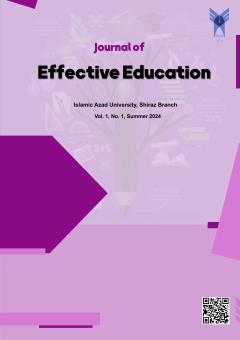Strategies of the words of Amir al-Mominin (peace be upon him) in education and training with the approach of governmental jurisprudence
Subject Areas : Educationhadi smailzadeh 1 * , hasan FllahAhmadghali 2
1 - Babol Branch Islamic Azad University
2 - Islamic Azad University, Babol Branch, Faculty of Theology and Islamic Studies
Keywords: Jurisprudence, governmental jurisprudence, education, training, Imam Ali (peace be upon her).,
Abstract :
Introduction: Government jurisprudence, facing the challenges of the present age, needs a detailed explanation of its foundations so that it can prove its effectiveness in different fields and dimensions such as education. According to the laws of Islamic jurisprudence, no one has the absolute right to establish divine laws except God, and God leaves this right to the chosen people by appointing a caliph and successor. Therefore, education has a longitudinal system, at the head of which is God, then the Prophet, and after him the imams. The main purpose of this research is to examine the strategies of the words of Hazrat Ali (a.s.) in education and training based on the perspective of government jurisprudence and to examine the principles, methods and goals of education and training in the words of that noble.
Research Methodology: The research method in this study is descriptive-analytical. And it has been done using library tools.
Findings: In his 34th sermon, Hazrat Ali (AS) mentioned four rights that people have over the government: the guidance of the general public, the commitment of the government to ensure the welfare of the people, education in a comprehensive manner, and discipline for steadfastness in practice.
Conclusion: The result of the present research from the words of Amir al-Mu'minin (AS) is that the relationship between the government and the people is a mutual relationship in education and the way of governance.
References
Holy Quran
Nahj al-Balagha
Akhwan Nouri, Shaqaig al-Sadat. (2022). The components of professional ethics in education and its functions from the perspective of the Qur'an and hadiths. Master's thesis. University of Quran Sciences and Education(In Persian).
Abdullah zadeh, A. (2023). The importance of Islamic education and the role of the teacher in it. The 7th National Conference on New Researches in Counseling, Educational Sciences and Psychology of Iran, Tehran. (In Persian).
Alam Al-Hoda, Jamila. (2002). The necessity of explaining Islamic education. Methodology of humanities. number 32, 49-33
Arafi, A. (2015). The effects of jurisprudence on the educational system. Culture Strategy, No. 36, 131-113(In Persian).
Baghlani, Farida. (2019). Explanation and analysis of critical thinking in the field of education and criticism of its implications in education based on the teachings of Islamic education. Master's thesis, Payam Noor University, Fars Province, Fasa branch
Bahrani, Ibn Maytham. (1996). Description and translation of Nahj al-Balagha. Tehran: Islamic Research Foundation
Faizul Islam, Ali Naghi. (1989). Translation and explanation of Nahj al-Balagha. Tehran: Faqih Printing and Publications
Jafari, Mohammad Taghi. (2018). Description and translation of Nahj al-Balaghah. Tehran: Islamic Culture Publishing House
Fawzi, Yahya, Karimi Biranvand, Massoud. (2011). the role of government in education; A comparative study of the views of Plato and Imam Khomeini (RA). Islam and educational research. number 1,
Gholami, N,. Mira Ahmadi, M. (2013). Individual jurisprudence and governmental jurisprudence, advantages and disadvantages. Sublime politics. number 4, (In Persian).
Hairi Shirazi, M. (2010), The mission of the clergy in family education. Qurani Kausar. number 40, 110-98(In Persian).
Khomeini, R. (1999). Imam's book Tehran: Imam Khomeini Editing and Publishing Institute(In Persian).
Majlisi, M,T. (1992). Bihar Al-Anwar Beirut: Dar al-Azwa(In Persian).
Makarem Shirazi, Nasser. (2019). The message of Imam Amirul Momineen (peace be upon him). Qom: Islamic Library
Mashkati, Hassan. (2018). What is Islamic education and training? How?. Isfahan: Hello Sepahan
Motahari, M. (1998). Familiarity with Islamic sciences. Tehran: Sadra. (In Persian).
Motahari, M. (2003). Education in Islam. Tehran: Sadra(In Persian).
Mardani Hamdani, F. (2021). Capacities of governmental jurisprudence in forming the development of civilization system. National Conference of Islamic Revolution and Horizon of Future Civilization, Tehran. (In Persian).
Meshkani Sabzevari, Abbas Ali, Meshkani, Abdul Hossein. (2011). An introduction to government jurisprudence from the Supreme Leader's point of view. Islamic government number 60, 184-155
Meshkani Sabzevari, Abbas Ali, Meshkani Sabzevari, Abdul Hossein. (2011). Relations between jurisprudence and government. Islamic government Number 3, 194-173. (In Persian).
Mikailo, Gholamhossein, Sultan al-Qarai, Khalil. (2014). Goals and methods of education from the perspective of Islam. Islamic insight and education. No. 35, 121-97
Mohammadi Poya, F. (2022). Presenting an educational model with the Jihad approach of explanation from the point of view of Nahj al-Balagha. Nahj al-Balagheh research paper. number 40, 24-1(In Persian).
Qadri, Mohammad. (2018). Concept and example of education in Ibn Sina's thought. The 3rd National Conference on Education and Lifestyle Psychology, Qazvin, Payamnoor University, Qazvin branch. (In Persian).
Soleimani Kia, A.(2017). Islamic education and non-Islamic education with a comparative view. The third international conference of psychology, educational and behavioral sciences, Tehran. (In Persian).
Soroush Mahalati, M.(2007). The responsibility of the Islamic government in formal education. Islamic education. number 5, 80-55(In Persian).
Shahab, M. (2021). Criticism of the fundamentals of education and training of the liberalism school with emphasis on the verses and narrations of Fariqin. Master's thesis, Jamia Al-Mustafa Gorgan University. (In Persian).
Site of leadership speeches. https://farsi.khamenei.ir Khamenei 31/6/1991
Zulfaqari, Mohammad, Seydian, Seyyed Mahdi. (2011). government jurisprudence; What, why, how. Political knowledge. number 1, 67-49

